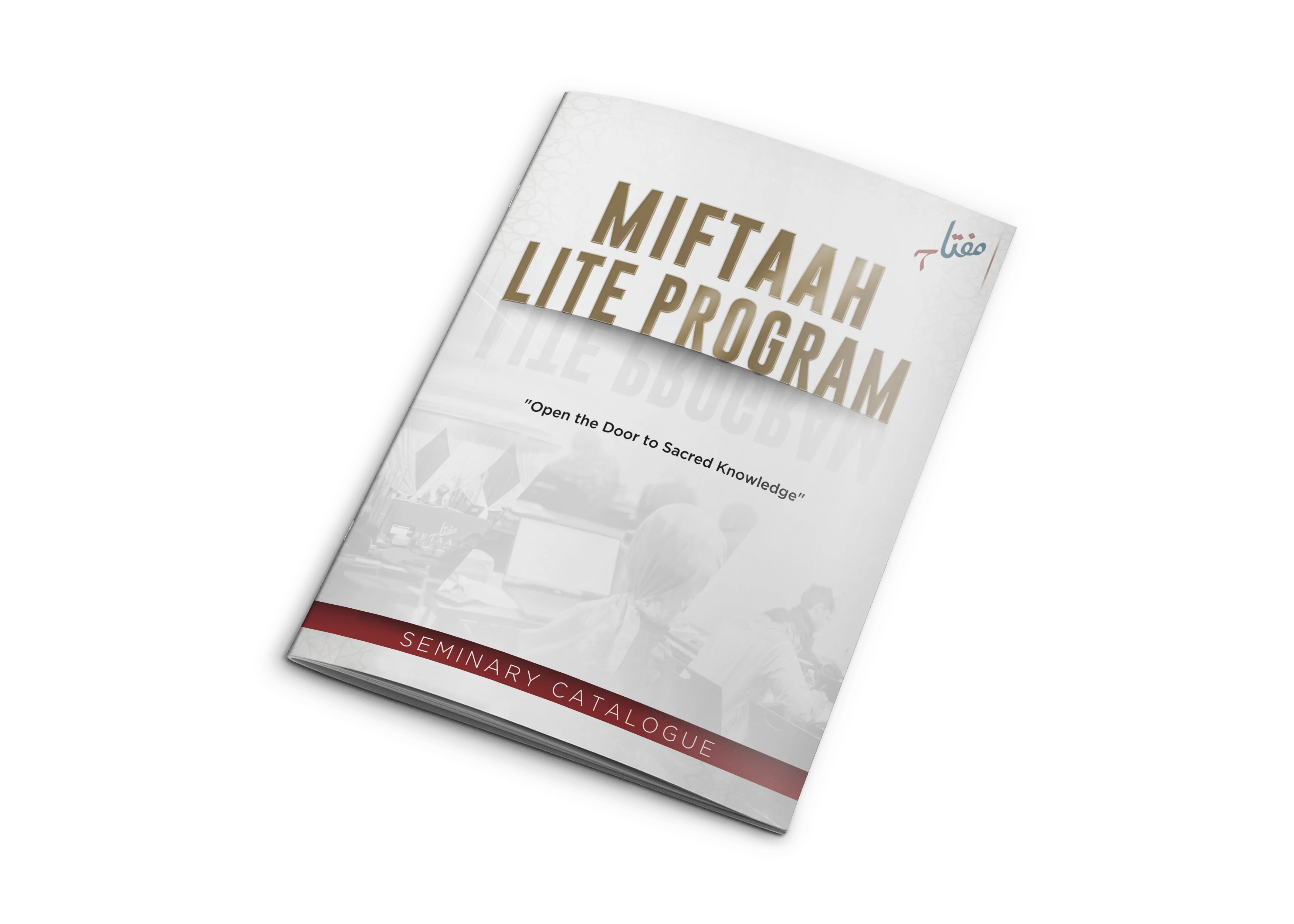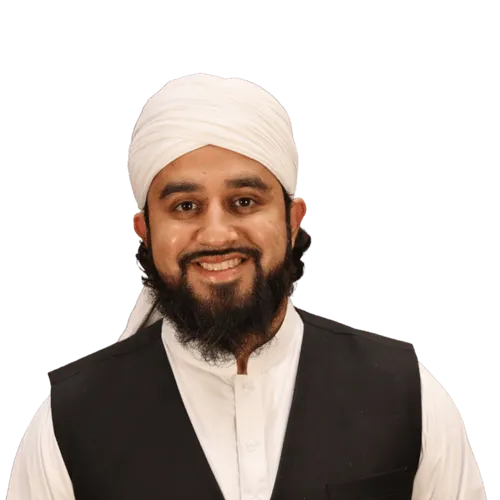What is the
Miftaah Lite?
Miftaah Lite provides college students and adults a primer on their journey to attain in-depth knowledge of the various disciplines of Islamic studies. Students will study Islam and cover classical scholarly approaches, providing them an introduction to the rich Islamic tradition and application of the Islamic disciplines. The course establishes a basic foundation and introduction to Islamic Studies and prepares students for further academic study.
Students in the Miftaah Lite Program must complete 8 courses to graduate. Upon completing the Miftaah Lite Program, students have the option of transitioning into the 3 Year Associate of Islamic Studies Program.
Courses
Building upon what is learnt in Introduction to Arabic Grammar, this class aims to reinforce many of the concepts learned in Introduction to Arabic Grammar, increase students’ vocabulary, and introduce them to new grammatical forms. The class focuses on providing students with a firm grasp of phraseology that is common to both spoken and written speech, including, but not limited to, a thorough review of Arabic possessive, descriptive, vocative, and indicative phrases. The class also covers how gender is used in Arabic, the full range of Arabic subjective, objective, and possessive pronouns, and the Arabic broken plural. As with Introduction to Arabic grammar, preparation for class and homework are essential so that students may devote in-class time to communicating in the language rather than talking “about” the language. Upon completion, students will be able to formulate basic sentences and speak Arabic on a beginner’s level.
Course Length: 2 Semesters
Text Used: First Steps to understanding Arabic
This course provides students with a necessary base understanding of how Arabic root letters are conjugated to create different words. By the end of the course, students will know how to conjugate verbs in various tenses, determine base letters from non-base letters, and identify verbal patterns that convey information about the number, gender, and voice of the subject of a sentence. Students will also be able to identify the usage of verbs in the Qur'an.
Course Length: 2 Semesters
Text Used:
This course consists of a systematic study of Arabic syntax and parallels the material learnt in Beginner Arabic Morphology I. The comprehensive text used in this course covers the various classifications of different types of sentences and the different components of a sentence’s anatomy, provides a basic but detailed understanding of the Arabic case system, and discusses how Arabic nouns respond to prepositions and verbs in accordance with the role the noun plays in the sentence.
Course Length: 2 Semesters
Text Used: Hidayat ul Nahw, Duroos ul Lughat (Shaykh Hashim al Qalam), Arabic Tutor 2
This course aims at giving students a chance to put their Arabic comprehension skills used in their first-year grammar and conversation class to use. It also develops those skills. The class uses Sheikh Abu Hassan Ali Nadwi’s classic didactic text Qasas al-Nabiyin (Stories of the Prophets) to provide students with a manageably challenging reading experience. The fun and engaging text of Qasas al-Nabiyin gradually introduces more complicated and varied grammar and vocabulary as the text goes on. Therefore, each qissah (story) becomes like a baby step towards higher level Arabic comprehension for the student. This class gives students the skill and confidence to begin digesting some of the Islamic intellectual traditions’ most difficult and important works.
Course Length: 2 Semesters
Text Used: Tafsir al Jalalyn
Students will study a compilation of verses from both the Quran. Various ayahs will be analyzed covering areas such as grammar, syntax, definitions, and moral conduct, encouraging the student to improve their knowledge of the Arabic language.
Course Length: 2 Semesters
Text Used: Tafsir al Jalalyn, Safwtul al Tafseer
This class is an introduction to the comprehension of primary religious sources in their original language and forms the basis of one’s ability to interpret, analyze, and apply Islam’s holy texts. Using the concise and to the point sayings of God’s Messenger (pbuh) collected in the classical text, students will begin to utilize concepts learned in their morphology and syntax classes to understand the Prophet’s (pbuh) words. A discussion of the grammar and vocabulary included in each hadeeth will be accompanied by a lesson on the hadeeth’s meaning and a discussion of its application in our place and time.
Course Length: 2 Semesters
Text Used: 40 Nawawi, Riyadus Saliheen HC
This Tazkiyah course will read and reflect over texts by Imam Ghazali, Imam Zarnuji, and other select texts. The objective of these readings is to train the student of knowledge by helping them learn practical tools to purify their hearts and build a stronger relationship with Allah SWT.
Course Length: 2 Semesters
Text Used: Purification of the Heart, Selection’s from Ihyaa, Ayuhal Wald Ghazali
Fall semester
Course Length: 1 Semester
Text Used: Miftaah 's 40 Hadith of Imam Nawawi
This class is an introduction to the comprehension of primary religious sources in their original language and forms the basis of one’s ability to interpret, analyze, and apply Islam’s holy texts. Using the concise and to the point sayings of God’s Messenger (pbuh) collected in the classical text The 40 Hadith of Imam Nawawi, students will begin to utilize concepts learned in their morphology and syntax classes to understand the Prophet’s (pbuh) words. A discussion of the grammar and vocabulary included in each hadeeth will be accompanied by a lesson on the hadeeth’s meaning and a discussion of its application in our place and time.
Course Length: 1 Semester
Text Used: Miftaah's Quran Exegesis: Surah Maryam
Complete translation and meaning of specific chapters are covered in this course. Special focus is given to the syntax and etymology of the words and structure used in the verses of the Holy Qur’an. Along with the translation, the course also incorporates interpretations of selected verses which enable the students to fully understand the meaning of the Qur’an.
Winter semester
Course Length: 1 Semester
Text Used: TBA
The human has a lifelong struggle of finding a way to grow closer to Allah in an effective manner. One of the last works Imam Al-Ghazali wrote was a comprehensive distillation of his Revival of the Islamic Sciences or Ihya. He lays out the book in a format of 40 essential principles of Islamic spirituality that guide the reader to improving one’s relationship with both the creator and creation. This class covers the first half of the book: The Essential Creed, and the Essential acts of worship.
Course Length: 1 Semester
Text Used: Miftaah PPT and Notes
Fiqh al-Sawm, the jurisprudence of fasting in Islam, represents a profound spiritual journey and a pillar of devotion during the holy month of Ramadan. This course offers a comprehensive exploration of Fiqh al-Sawm, providing students with a deep understanding of the principles, regulations, and spiritual dimensions of fasting in Islam.Fiqh al-Zakat, the jurisprudence of zakat in Islam, stands as a vital pillar of social justice and communal welfare, encapsulating the spirit of compassion and solidarity within the Muslim community. This course offers a comprehensive examination of Fiqh al-Zakat, providing students with a deep understanding of the principles, regulations, and practical applications of this obligatory act of charity.
Course Instructors
Semester Schedule
January 3th, 2025
January 6th, 2025
February 25 - April 6, 2025
May 5th, 2025
Program information
May 5th, 2025
Guidelines for Graduation
The Miftaah Lite Seminary Curriculum is centered around 6 Core Subjects
One of the main factors that distinguish our program is its graduation requirements. To complete the program and graduate, students must receive a passing score for each course. To complete the Miftaah Lite program, the student must complete at least 2 courses per semester for a total of 8 courses over two years.
A total of 8 course courses are needed to qualify for the Miftaah Lite certificate. After completing 8 courses of the Lite program, students are encouraged to transfer to the Associate Program located at the Miftaah Campus.
Learn more
Not ready to enroll but want to learn more?
Download the program catalog to review program details.

frequently
Asked
Questions

Tuition payments may be made per semester.

The program is open to students that are 15 and older.

Classes will be held Mondays from 7:00 PM to 9:00 PM EST.

Classes are held at the UMMA located at 31333 Southfield Road,
Beverly Hills, MI 48025.

No, the Miftaah Lite Program will be only available onsite.

Miftaah will provide course textbooks, and lifetime access to the student portal, including recordings, PowerPoints, and course material.











.avif)





